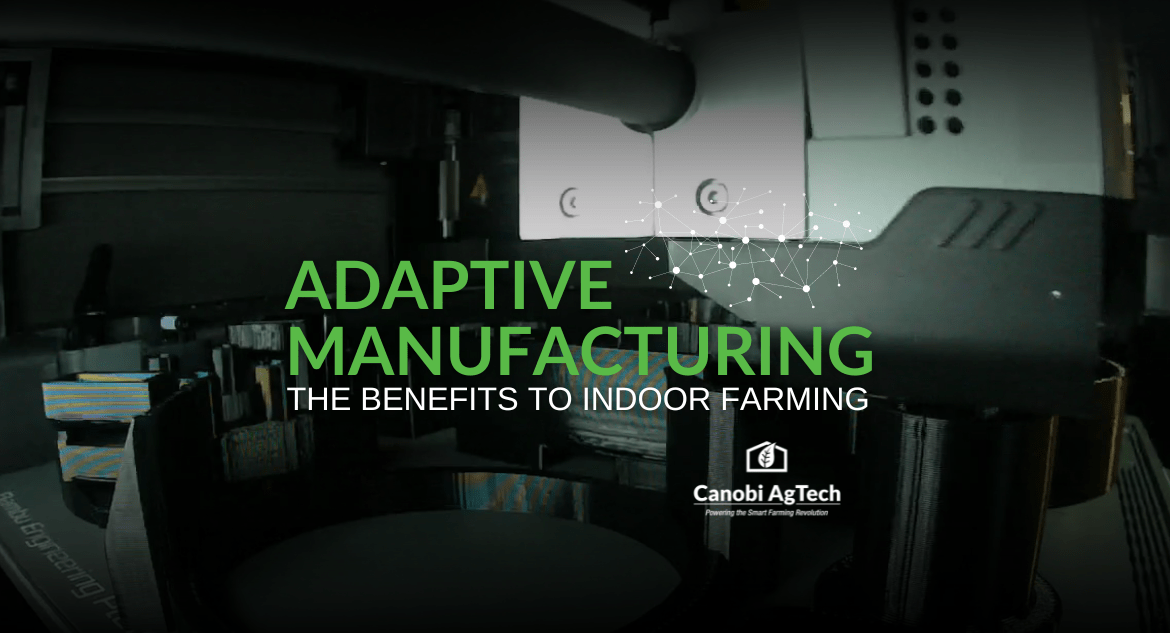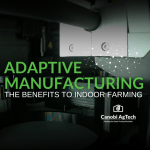Indoor farms that introduce an adaptive approach to manufacturing – widely referred to as adaptive manufacturing – place emphasis on flexibility, responsiveness, and agility in their production processes. This outlook accommodates changes in customer demand, product variations, and market conditions, simply and efficiently.
Within the indoor farming industry, an adaptive approach to manufacturing uses advanced technologies, such as automation, robotics, data analytics, and artificial intelligence, to enable rapid adjustments to production schedules, product designs, and manufacturing processes. At Canobi, we include a high performance 3D printer with every turnkey system to enable operators to print spare parts and implement essential upgrades without leaving their farm; adaptive manufacturing meets indoor farming!
Adaptive Manufacturing: The Benefits to Indoor Farming
The greatest benefits of introducing adaptive manufacturing to indoor farms are flexibility, responsiveness, and agility.
Flexibility
To accommodate changes in product specifications, volume, or customer requirements, adaptive manufacturing’s flexibility enables indoor farms to swiftly and effectively respond to changes within their industry and marketplace.
As market demands evolve, or as new product variations are introduced, adaptive manufacturing allows for seamless adjustments to production processes to meet these changes. Whether it is altering the size, shape, features, or materials used in the product, flexible manufacturing systems can adapt to these requirements without significant downtime or retooling.
The flexibility that adaptive manufacturing affords, enables indoor farm operators to rapidly scale production (up or down) in response to changes in market demand. This scalability ensures that companies can meet their customers’ orders efficiently, without excess inventory buildup or delays in production.
Adaptive manufacturing empowers indoor farms to maintain agility in today’s dynamic business environment. The flexibility enables them to meet changing market demands, drive innovation, and maintain a competitive advantage in the marketplace.
Responsiveness
Adaptive manufacturing is characterized by its ability to promptly adapt to changes in external factors, including fluctuations in demand, shifts in market trends, or disruptions in the supply chain. This responsiveness is essential for indoor farms to maintain operational efficiency, meet customer demands, and remain competitive in today’s dynamic business environment.
Trends in the market are constantly evolving, driven by factors such as technological advancements, changing consumer preferences, and competitive pressures. Adaptive manufacturing allows indoor farms to quickly adapt to emerging market trends and respond to changing customer needs. At Canobi, this involves introducing new product variations, modifying existing designs, or launching innovative features to help your indoor farm stay ahead of the competition. By staying agile and responsive to market dynamics, indoor farm operators will maintain their relevance and drive growth.
Disruptions in the supply chain, such as raw material shortages, delays in shipping, or geopolitical events, can have significant implications for indoor farming operations. Adaptive manufacturing enables indoor farm operators to mitigate the impact of these disruptions by implementing alternative sourcing strategies, diversifying their supplier base, and/or optimizing inventory management practices. By having contingency plans in place, and the flexibility to adapt quickly to changing circumstances, indoor farms can minimize disruptions and maintain continuity in their operations.
Agility
The agility demonstrated by adaptive manufacturing shows the capacity for indoor farms to rapidly deploy resources and implement changes when responding to new opportunities or competitive threats.
Adaptive manufacturing enables indoor farm operators to quickly and efficiently respond to changing market conditions or business needs. Whether it is scaling up production capacity to meet increased demand, introducing new technologies to enhance efficiency, or reallocating resources to address critical tasks, indoor farms can adapt their operating strategies to align with strategic objectives and optimize performance.
Maintaining agility enables companies to implement changes quickly and seamlessly in response to new opportunities or competitive threats. Whether it is introducing product innovations, modifying production processes, or adjusting supply chain strategies, companies can adapt their operations to stay ahead of the curve.
Adapt quickly, effectively to evolving conditions and needs
Including adaptive manufacturing within the indoor farming industry enhances efficiency, reduces lead times, minimizes waste, and increases customer satisfaction by enabling indoor farm operators to adapt quickly and effectively to dynamic market conditions and evolving customer needs. At Canobi, we believe that the ability to promptly adapt to fluctuations in demand, market trends, and supply chain disruptions is essential for indoor farms to remain competitive, resilient, and customer-focused in today’s fast-paced global economy.





